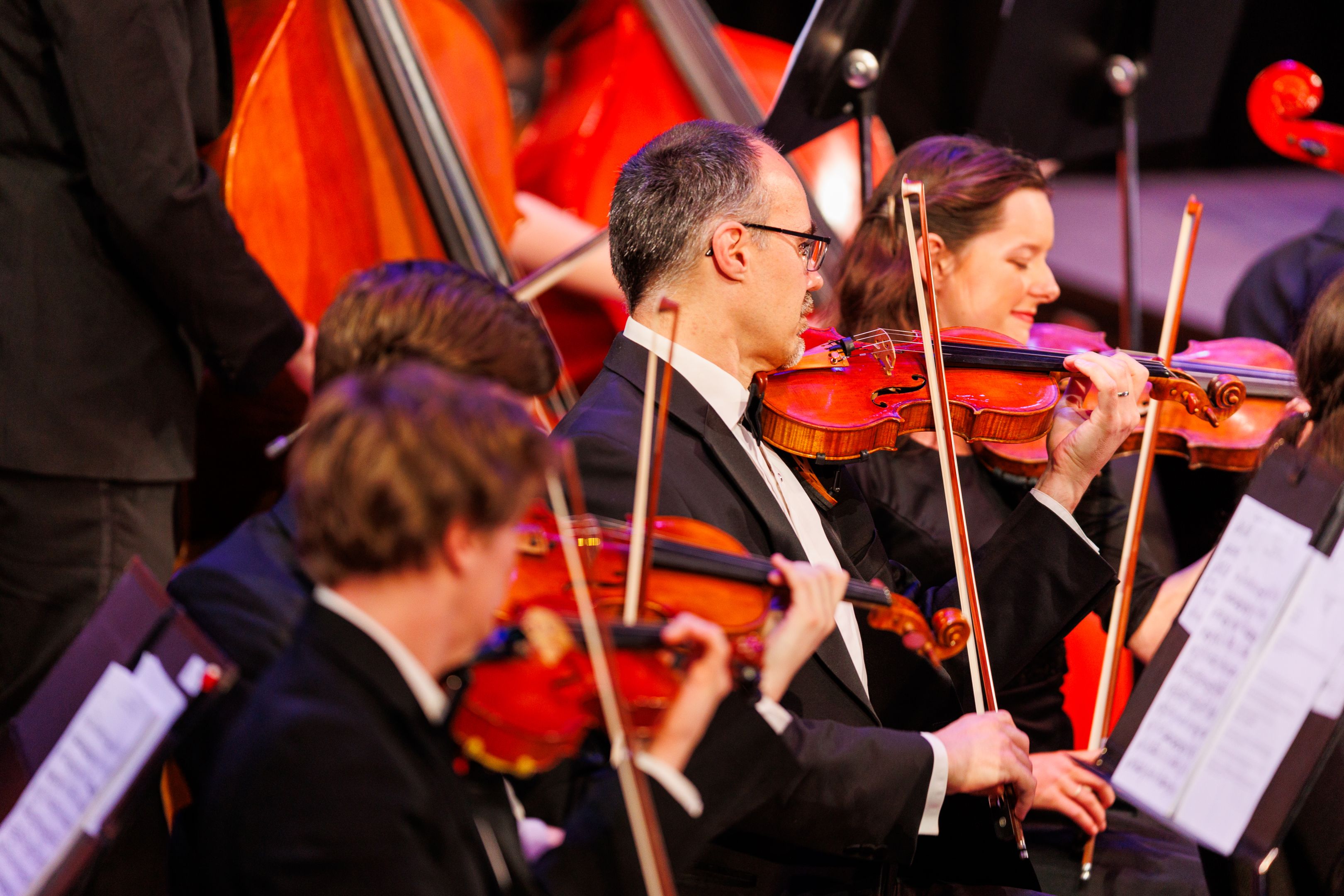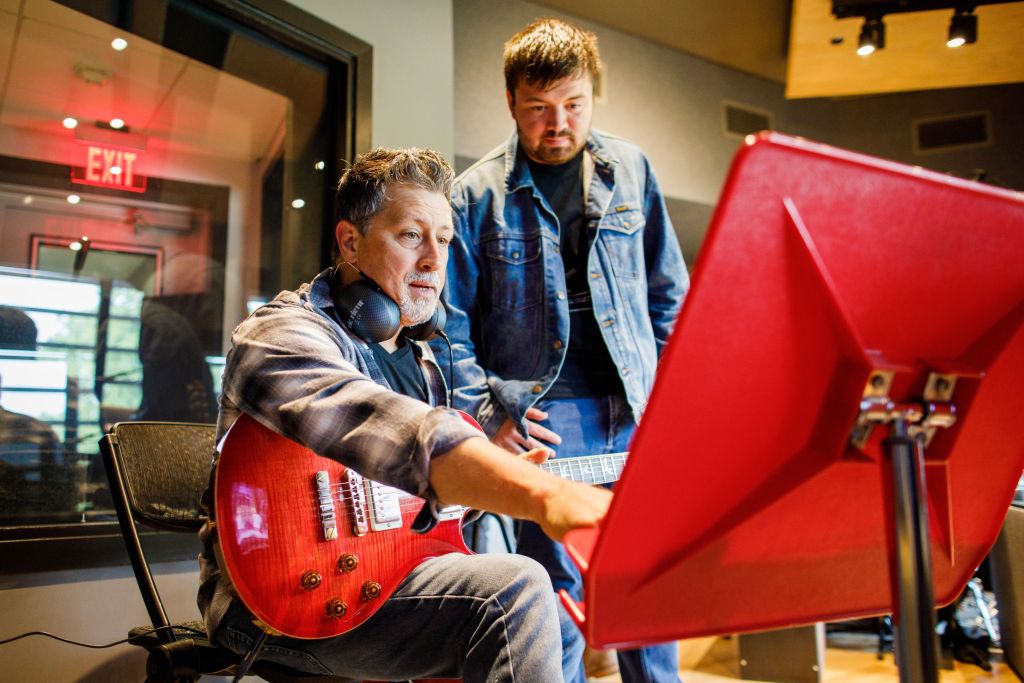
Bachelor of Music in String Performance
Grow as a Musician with Our BM in String Performance Degree
Do love music and want to share that passion as an accompanist, soloist, or maybe even as an instructor? Throughout our Bachelor of Music (BM) in String Performance, you can further your skills in the string instrument of your choice by working 1-on-1 with our distinguished faculty members – who have performed around the world – as well as with singers and musicians like Yo-Yo Ma, Stevie Wonder, and Michael W. Smith.
At Liberty, our mission is to help you grow as a musician who leads with integrity in the music industry. Our BM in String Performance degree can help prepare you to share your love of music in a way that impacts eternity.
Credit Hours
View CoursesNext start date: Aug 18, 2025

NASM Accredited
Highlights
Highlights of Our BM in String Performance Degree
Liberty Music Group: A Student-Run Music Label
Liberty Music Group (LMG) is our School of Music’s professional music publishing and recording company, and this student-run label provides students, staff, and faculty with the opportunity to publish their work.
Explore Diverse Musical Ensembles
Participate in our School of Music ensembles that perform in styles ranging from folk and bluegrass to a cappella and Latino.
Wind Symphony Performs on a Prestigious Stage
Our wind symphony has performed at the CBDNA Southern Division Conference.
Graduates Making an Impact in Music
We are dedicated to producing graduates of distinction, and our graduates have found careers playing for stars like Carrie Underwood as Christian singers and songwriters, worship leaders at Harvest Bible Chapel, and conductors leading choir festivals throughout Southeast Asia.
Career Potential
What Can You Do with a String Performance Bachelor’s Degree?
Liberty University’s Bachelor of Music in String Performance can help prepare you to pursue the following occupations:
- Accompanist
- Conductor
- Music therapist (requires graduate study)
- Private music teacher
- Professional musician


#4 Best College Campus in America
At Liberty, you’ll find an affordable, high-quality education designed to help equip students like you for the real world. Our commitment to excellence has earned us recognition as the #4 Best College Campus in America by Niche.com.
Earning your degree from a nonprofit university with state-of-the-art resources like ours can help set you apart from your peers.
Courses
What Will You Study in Our String Performance Bachelor’s Degree Program?
Throughout our BM in String Performance degree program, you can study the basic components of music, including harmonic and commercial theory, musicianship, and conducting, so you are prepared for additional in-depth study of string instruments. You will also have the opportunity to work 1-on-1 with instructors to further your study of the instrument you choose. During your time studying with us, you can take advantage of performing with our symphony orchestra and other ensembles for additional experience.
Our bachelor’s degree in string performance can help you prepare for a career in the music industry. You can study how to teach string instruments and conduct ensembles, giving you skills to become a private music teacher or lead a youth or community orchestra. In addition, you can study entrepreneurship and the Christian music community, opening the door to potentially pursue a career as a professional musician.
Featured Bachelor of Music in String Performance Courses
MUSC 200 – Music, Art, Worship, and Culture
MUSC 317 – Instrumental Conducting
MUSC 364 – Contemporary Styles Survey I
MUSC 374 – String Techniques
Degree Information
- This program falls under the School of Music
- View the Degree Completion Plan
- Check out our course catalog
- Transfer in up to 75% of the degree total
BENEFITS
Why Choose Liberty’s Bachelor’s in Music – String Performance Degree?
Purposeful Preparation for Your Future in Music
We are committed to helping equip you with valuable training in the music industry – all while helping you use your musical talents to glorify God. Whether your path leads to performance, teaching, or ministry, our program is designed to help you grow both artistically and spiritually.
World-Class Faculty with Global Experience
In our string performance program, you’ll study under faculty members who have performed around the world and hold degrees from some of the most prestigious music schools in the country. Their experience and mentorship can help you refine your technique, expand your musical expression, and prepare for your professional journey.
A Top-Ranked School with Diverse Opportunities
As one of the top 10 largest schools of music in the nation, Liberty offers an exceptional range of classes and performance opportunities. From wind symphonies and jazz ensembles to chamber groups and solo recitals, you’ll have countless ways to develop your skills and showcase your talent.
Professional-Grade Facilities and Resources
We are dedicated to creating the best possible academic environment. Our rehearsal, recording, and performance spaces are outfitted with state-of-the-art technology – allowing you to gain hands-on experience with the tools used in today’s music industry. Combined with instruction from expert musicians, these resources can support your growth from day 1.
Admissions
How Do You Become a BM in String Performance Student?
Every application is reviewed by the admission committee on a case-by-case basis, meaning there are no set minimums for acceptance. However, all applicants must submit the following documents* for admission:
- Admission application
- Official high school transcripts
- Official college transcripts (if applicable)
- Admission essay
Results from the CLT, SAT, or ACT are not required for admission, but may be used in consideration for merit-based aid.
*Note that additional documentation may be requested by the admission committee after your application has been received.

Have Questions?
We’ll make sure you have the information you need to take your next step.